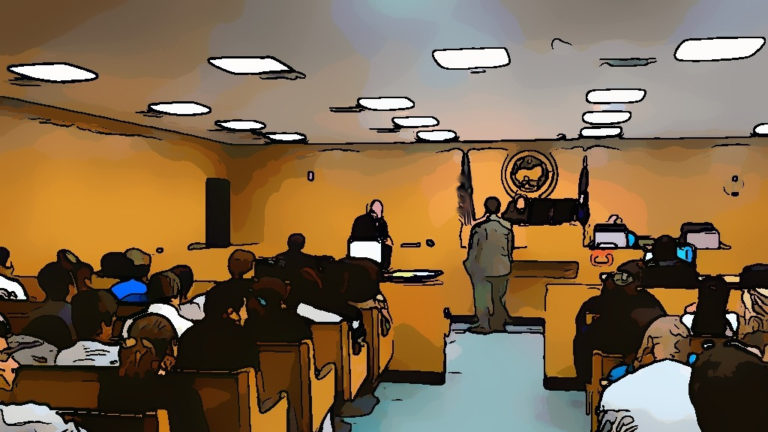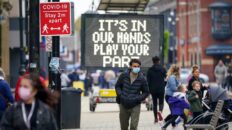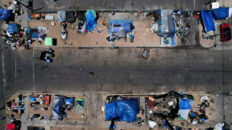Pot users might not be ending up in jail as frequently as they did 10 years ago. But cops, judges, and courts still exercise arbitrary power to ruin people’s lives, and they continue to do so at astonishing rates, all over the country.
I recently saw this firsthand. I sat in a municipal traffic court from 9:00 a.m. to 6:00 p.m., awaiting my own time with the judge for a petty moving violation. I was there with 150 other people, gathering cobwebs as the judge took his sweet time and shamed people as they stood at the bench and humbly submitted to his rule.
No phones or computers are allowed in court. My iPad was not allowed, either. Once you enter through the metal detector, you are trapped for the duration. There is no contacting anyone. For most people today, this would be the only time in their lives when such contact is forbidden. This rule contributes to the feeling of being controlled by and subjected to power.
You just have to wait your turn, even if it takes eight hours. So there we sat.
Not one person in this courtroom had harmed anyone. Not one. They had not stolen anything, had not mugged anyone, had not caused any car wrecks. And yet there they were, facing torment at the hands of a judge drunk on power and a criminal-justice system that is out of control.
Most of my fellow criminals were poor, young, black men who had been stopped for some traffic violation and then booked for a different, unrelated offense. Why the lopsided demographics? Were these people targeted? It would be hard to prove, but it seems highly likely.
The supposed crimes called out by the judge were all over the map: there was too much tinting on the windows, the license plate light was burned out, the vehicle was following too closely, the driver was speeding (of course), the car had expired tags, the driver wasn’t carrying proof of active insurance, and so on.
Each person was fined between $500 and $3,000, and always on a plea bargain. They admitted guilt for something in exchange for paying a reduced fine.
For example, the judge dismissed my one charge (not complying with the “move over” rule — which requires a drive to switch lanes away from a patrol car on the shoulder — a rule I didn’t know existed) and I admitted guilt for something that wasn’t even true: driving without my license. In fact, I did have my license, so the form I signed was a lie that the judge had me tell. By what understanding of justice does the court blackmail you to admit to crimes you didn’t commit?
Fully one-third of these people had been dragged in for pot possession. In the typical scenario, a cop would stop a car on a rural stretch for some minor moving violation. The cop would claim to smell pot, which constitutes probable cause, and initiate a thorough search of the car. The cop would find a pipe or some pot, arrest the person, and then issue a few other tickets in addition, for things like no proof of insurance, a burnt-out taillight, and so on. But it was the pot charge that had landed these drivers in front of the judge.
Repeatedly, the judge reminded the accused, “We are not in Colorado. In the state of Georgia, your offense carries with it a 12-month prison sentence.”
The judge then said he would not send the person to jail. He dismissed a few other charges, thereby positioning himself as a merciful public servant. He was then in a position to get any of these poor souls to admit guilt for anything as long as they would get a lesser sentence.
Everyone was fined. But some punishments went further. The pot criminals were required to do 50 to 100 hours of community service, taking away time from school, work, and family. They now have to attend classes on the dangers of drugs (I’m sure those work!). They also must submit to six months of drug testing to make sure they are not consuming this dangerous substance. They prove this by sending in urine samples. Now I understand why there is such a burgeoning market for synthetic urine.
They also get a criminal record.
Then there’s the fine. Most people could not pay hundreds or thousands of dollars on the spot. The judge gave them one month to cough up the money. Where are these poor people going to get that kind of money? One solution that immediately occurred to me: they could get into the drug business temporarily. Another option: steal the money. How much crime is being brought about through these fines?
Then there were the DUI charges, which carried stiffer penalties, including suspension of licenses. Probably one-third of the people were there to deal with that problem. Again, there was no evidence in the courtroom that middle-class white people have ever gotten behind the wheel after consuming too much alcohol. This courtroom gave a strong impression that the only drunk drivers are young black men.
Stuck in this room for eight-plus hours, without a computer or other reading material, the only thing I could do was count the fines. I came up with an estimate of $75,000 collected on that day. And the judge was brazen about it all.
He kept asking each person, “When are you going to pay me?”
Despite this appalling display, everyone treated the judge as some kind of great man. Court employees laughed uproariously at his terrible jokes, nodded in agreement when he would moralize about pot, and complied with his every command. I think he believed he was doing good for the community, based on the many ways in which he congratulated himself on his dedicated work.
The whole system is clearly a tax-collection scheme masked as justice. In the end, what this court wanted was money, and the people it squeezed were the least able to pay.
What I saw rivaled the worst forms of petty tyrannies I’ve read about in history books: how tyrannical kings would use every trick to pillage the population of their meager resources. I very much doubt that there is anything unusual about what I saw. It probably goes on every day in your town, too.
Not one person in that room needed to be mixed up with the court system. None of the money and time they gave up deserved to be taken. A true dispenser of justice would have flung open the doors and set the captives free.
Instead, they were subjected to an excruciating, pillaging, and humiliating system that barely masks its true nature.
And we wonder why so many people are unhappy with the system.
A version of this article appeared at FEE.org














For the “guilty” among us: I can conjure a large volume of THC-free natural urine at the drop of a $20 bill.
Twenty…now twenty…now twenty…who will give me fifteen?…do I hear fifteen…I’ve got fifteen now….who will give me ten?…do I hear ten anywhere… (free market at work)
For the “guilty” among us: I can conjure a large volume of THC-free natural urine at the drop of a $20 bill.
Twenty…now twenty…now twenty…who will give me fifteen?…do I hear fifteen…I’ve got fifteen now….who will give me ten?…do I hear ten anywhere… (free market at work)
For the “guilty” among us: I can conjure a large volume of THC-free natural urine at the drop of a $20 bill.
Twenty…now twenty…now twenty…who will give me fifteen?…do I hear fifteen…I’ve got fifteen now….who will give me ten?…do I hear ten anywhere… (free market at work)
A few years back I was given a speeding ticket, 31 in a 25 and I had a hankering to attend court to see what it was like.
Doors opened at 6:00 p.m. as I recall but people were well queued up before then because it’s a first come, first serve system. I was there on time but ended up near the end of the line.
The suburb in which I was ticketed is Clayton, Missouri. Population 15,939, 78% white, 8.2% black (African American if I’m forced to be politically correct).
The population of that courtroom. aside from officials, I’d guess was 95% black. My black neighbors laughed at me when I told them I got busted for driving six miles an hour over the speed limit.
It took about two and a half hours to get through the system. I politely refused the judge’s kind offer of traffic school (for a fee) to avoid the points on my license. I left disillusioned.
I suppose all of this is my long-winded way of saying, “You’re right. Good article.”
But, I’m a writer, please pardon me telling my story, I can’t help myself.
Tom
A few years back I was given a speeding ticket, 31 in a 25 and I had a hankering to attend court to see what it was like.
Doors opened at 6:00 p.m. as I recall but people were well queued up before then because it’s a first come, first serve system. I was there on time but ended up near the end of the line.
The suburb in which I was ticketed is Clayton, Missouri. Population 15,939, 78% white, 8.2% black (African American if I’m forced to be politically correct).
The population of that courtroom. aside from officials, I’d guess was 95% black. My black neighbors laughed at me when I told them I got busted for driving six miles an hour over the speed limit.
It took about two and a half hours to get through the system. I politely refused the judge’s kind offer of traffic school (for a fee) to avoid the points on my license. I left disillusioned.
I suppose all of this is my long-winded way of saying, “You’re right. Good article.”
But, I’m a writer, please pardon me telling my story, I can’t help myself.
Tom
Boy, do I hate to “be this way,” because I’ve been in traffic court and had exactly the same reaction the author here did. On almost every single point you make, especially the general mistreatment of citizens. Surely the “reason” that would be offered for this, which is more an “excuse,” would be that it’s part of the punishment. Behaviors that wind you up in court need to be discouraged. Of course this entirely disregards the presumption of innocence and any attempt at matching the punishment to the crime. It’s for everyone, innocent and guilty alike, and it’s one size fits all. And it’s about money more than safety. The whole circus breeds disrespect for the law.
But some of this has to do with the crowd that is there. Your average crowd in traffic court is a lot like a bad day in Walmart or at the County Fair, and the handling of the group reflects that. It’s not right, it’s still an indignity and an insult to the citizens, but I would not say it’s unnatural. And I certainly wouldn’t imply racism in the system from the makeup of the crowd. You need a lot more reason than the outcome to raise that tired specter.
Nothing I’ve seen firsthand or read (that looks past the results, the raw disproportionate numbers) has indicated racism against blacks. In fact, if anything, the opposite is true. Standards tend to be lowered where expectations are lower. And expectations of behaviors that draw citations are much lower (expectations are worse) for blacks. And if you look, I think you’ll find highly disproportionate numbers of blacks in court North, South, East, and West, including areas that have majority black police forces.
Racism is not a charge that should be lightly made. Yet the author suggests it while admitting to having zero evidence of it past raw numbers. That should never be done. The fact is, blacks do commit hugely more crime than whites, and blaming racism for that justifies, even incites the ugly mob behaviors such as the BLM movement.
One more point. I live in a County that is 75% white but at the edge of a much more populous City in a 70% black County. I have been in court in both Counties, and there is nothing to chose between them. Both experiences can suck unnecessarily. In fact the most disrespectful and demeaning treatment I’ve experienced was in my home (whiter) County on jury duty, where none of us in court was guilty of anything. Yet we were treated like cattle. The problem is power, and the simple fact that it corrupts. This article’s headline about targeting, implying racism without evidence, is unjustified and irresponsible.
Boy, do I hate to “be this way,” because I’ve been in traffic court and had exactly the same reaction the author here did. On almost every single point you make, especially the general mistreatment of citizens. Surely the “reason” that would be offered for this, which is more an “excuse,” would be that it’s part of the punishment. Behaviors that wind you up in court need to be discouraged. Of course this entirely disregards the presumption of innocence and any attempt at matching the punishment to the crime. It’s for everyone, innocent and guilty alike, and it’s one size fits all. And it’s about money more than safety. The whole circus breeds disrespect for the law.
But some of this has to do with the crowd that is there. Your average crowd in traffic court is a lot like a bad day in Walmart or at the County Fair, and the handling of the group reflects that. It’s not right, it’s still an indignity and an insult to the citizens, but I would not say it’s unnatural. And I certainly wouldn’t imply racism in the system from the makeup of the crowd. You need a lot more reason than the outcome to raise that tired specter.
Nothing I’ve seen firsthand or read (that looks past the results, the raw disproportionate numbers) has indicated racism against blacks. In fact, if anything, the opposite is true. Standards tend to be lowered where expectations are lower. And expectations of behaviors that draw citations are much lower (expectations are worse) for blacks. And if you look, I think you’ll find highly disproportionate numbers of blacks in court North, South, East, and West, including areas that have majority black police forces.
Racism is not a charge that should be lightly made. Yet the author suggests it while admitting to having zero evidence of it past raw numbers. That should never be done. The fact is, blacks do commit hugely more crime than whites, and blaming racism for that justifies, even incites the ugly mob behaviors such as the BLM movement.
One more point. I live in a County that is 75% white but at the edge of a much more populous City in a 70% black County. I have been in court in both Counties, and there is nothing to chose between them. Both experiences can suck unnecessarily. In fact the most disrespectful and demeaning treatment I’ve experienced was in my home (whiter) County on jury duty, where none of us in court was guilty of anything. Yet we were treated like cattle. The problem is power, and the simple fact that it corrupts. This article’s headline about targeting, implying racism without evidence, is unjustified and irresponsible.
@cadence88 : I would start here. https://en.wikipedia.org/wiki/Race_and_the_War_on_Drugs. The raw metrics show black are more likely than whites to be arrested for similar offenses, found guilty more often, and sentenced to longer prison terms.
Tom, if Jeffrey had cited some support for the racism charge aside from what he did (disproportionate representation in court) I would have looked at it. He didn’t, and I was just expressing my feeling that the racism charge was much too freely made. He was frank in saying he couldn’t be sure, it just looked like it, but he went there anyway.
The article you cite is merely more of the same. More blacks are in court, so there must be racism. No amount of “raw metrics” will get you where you want to go.
I should leave it at that, because I can feel the racism charge coming my way. But I will just suggest that if you could step outside of the constant storm of racism charges that we swim in, pretend to be from Mars, say, and take a stroll around your local Harlem, just looking around, observing attitudes and behavior, I have to believe you’d get some idea why the crime data is what it is. That’s superficial, and doesn’t prove a thing, and there are doubtless reasons for it that have little to do with race, but raw data only shows what, not why.
What do you make of the fact that almost all reported murders by blacks are of blacks? Or that while there are relatively few cases of black-on-white crime, there are far fewer cases of white on black crime. The only way raw data will get you where you want to go, justifying the charge of racism, is if you accept that disproportionate results – such as too many blacks in the courtroom – prove racism. Of course that is not true, but per Texas Housing v. Inclusive Communities, you do have the US S.C. on your side if you believe it.
That kind of thinking is the forced illogical (and ammoral, actually) conclusion of the progression we have been on in the race arena. The race business has gone from laissez-faire free association to nondiscrimination to equal opportunity which mutated into affirmative action, then goals, which became quotas and now we have “equality of outcomes” and “white guilt” that can’t be absolved because it’s in our skin color. You needn’t even cite disparate results, just look at your skin color. If it’s white, you’re guilty.
Don’t look now (most won’t), but the race industry has jumped the shark.
@cadence88 : I would start here. https://en.wikipedia.org/wiki/Race_and_the_War_on_Drugs. The raw metrics show black are more likely than whites to be arrested for similar offenses, found guilty more often, and sentenced to longer prison terms.
Tom, if Jeffrey had cited some support for the racism charge aside from what he did (disproportionate representation in court) I would have looked at it. He didn’t, and I was just expressing my feeling that the racism charge was much too freely made. He was frank in saying he couldn’t be sure, it just looked like it, but he went there anyway.
The article you cite is merely more of the same. More blacks are in court, so there must be racism. No amount of “raw metrics” will get you where you want to go.
I should leave it at that, because I can feel the racism charge coming my way. But I will just suggest that if you could step outside of the constant storm of racism charges that we swim in, pretend to be from Mars, say, and take a stroll around your local Harlem, just looking around, observing attitudes and behavior, I have to believe you’d get some idea why the crime data is what it is. That’s superficial, and doesn’t prove a thing, and there are doubtless reasons for it that have little to do with race, but raw data only shows what, not why.
What do you make of the fact that almost all reported murders by blacks are of blacks? Or that while there are relatively few cases of black-on-white crime, there are far fewer cases of white on black crime. The only way raw data will get you where you want to go, justifying the charge of racism, is if you accept that disproportionate results – such as too many blacks in the courtroom – prove racism. Of course that is not true, but per Texas Housing v. Inclusive Communities, you do have the US S.C. on your side if you believe it.
That kind of thinking is the forced illogical (and ammoral, actually) conclusion of the progression we have been on in the race arena. The race business has gone from laissez-faire free association to nondiscrimination to equal opportunity which mutated into affirmative action, then goals, which became quotas and now we have “equality of outcomes” and “white guilt” that can’t be absolved because it’s in our skin color. You needn’t even cite disparate results, just look at your skin color. If it’s white, you’re guilty.
Don’t look now (most won’t), but the race industry has jumped the shark.
@cadence88 : I would start here. https://en.wikipedia.org/wiki/Race_and_the_War_on_Drugs. The raw metrics show black are more likely than whites to be arrested for similar offenses, found guilty more often, and sentenced to longer prison terms.
Tom, if Jeffrey had cited some support for the racism charge aside from what he did (disproportionate representation in court) I would have looked at it. He didn’t, and I was just expressing my feeling that the racism charge was much too freely made. He was frank in saying he couldn’t be sure, it just looked like it, but he went there anyway.
The article you cite is merely more of the same. More blacks are in court, so there must be racism. No amount of “raw metrics” will get you where you want to go.
I should leave it at that, because I can feel the racism charge coming my way. But I will just suggest that if you could step outside of the constant storm of racism charges that we swim in, pretend to be from Mars, say, and take a stroll around your local Harlem, just looking around, observing attitudes and behavior, I have to believe you’d get some idea why the crime data is what it is. That’s superficial, and doesn’t prove a thing, and there are doubtless reasons for it that have little to do with race, but raw data only shows what, not why.
What do you make of the fact that almost all reported murders by blacks are of blacks? Or that while there are relatively few cases of black-on-white crime, there are far fewer cases of white on black crime. The only way raw data will get you where you want to go, justifying the charge of racism, is if you accept that disproportionate results – such as too many blacks in the courtroom – prove racism. Of course that is not true, but per Texas Housing v. Inclusive Communities, you do have the US S.C. on your side if you believe it.
That kind of thinking is the forced illogical (and ammoral, actually) conclusion of the progression we have been on in the race arena. The race business has gone from laissez-faire free association to nondiscrimination to equal opportunity which mutated into affirmative action, then goals, which became quotas and now we have “equality of outcomes” and “white guilt” that can’t be absolved because it’s in our skin color. You needn’t even cite disparate results, just look at your skin color. If it’s white, you’re guilty.
Don’t look now (most won’t), but the race industry has jumped the shark.
There remain too many Americans of the nanny state who will rise to defend this fleecing . Until that changes, nothing will. There seems to be a natural desire of citizens to believe that the system they live under is just, for accepting the alternative creates much cognitive dissonance. “It keeps our streets safe, and traffic deaths down,” goes their thinking. They believe in the goodness of government. Therein is the real problem.
There remain too many Americans of the nanny state who will rise to defend this fleecing . Until that changes, nothing will. There seems to be a natural desire of citizens to believe that the system they live under is just, for accepting the alternative creates much cognitive dissonance. “It keeps our streets safe, and traffic deaths down,” goes their thinking. They believe in the goodness of government. Therein is the real problem.
There remain too many Americans of the nanny state who will rise to defend this fleecing . Until that changes, nothing will. There seems to be a natural desire of citizens to believe that the system they live under is just, for accepting the alternative creates much cognitive dissonance. “It keeps our streets safe, and traffic deaths down,” goes their thinking. They believe in the goodness of government. Therein is the real problem.
There remain too many Americans of the nanny state who will rise to defend this fleecing . Until that changes, nothing will. There seems to be a natural desire of citizens to believe that the system they live under is just, for accepting the alternative creates much cognitive dissonance. “It keeps our streets safe, and traffic deaths down,” goes their thinking. They believe in the goodness of government. Therein is the real problem.
One could write a book about what People (citizens) DON’T KNOW about about TRAFFIC-COURT and/or the way it “works”. The first thing to know is that DRIVING is a technical “Legal” term that means that you are “using” the highway for a commercial-purpose. The next thing to know is that the “Traffic-Stop” was actually curb side “Court” and when you take your “ticket” to the Court Room you are actually doing an Appeal. Often the “Judge” is only a Traffic Commissioner and not even a Judge. In any case most of the so called proceedings are under Administrative Law which is a whole different ball game than you are lead to believe. In short the whole thing is a commercial money making scam (fraud). Thousands of citizens have “investigated” and exposed the FRAUD of TRAFFIC COURT, but the time and energy that it takes to avoid the traps OR get out of the trap if one gets caught usually costs more than the “average” ticket, and most people have been brain washed into thinking the they must have the LICENSE and that “driving” is a PRIVILEGE. Aren’t Public Schools wonderful?
One could write a book about what People (citizens) DON’T KNOW about about TRAFFIC-COURT and/or the way it “works”. The first thing to know is that DRIVING is a technical “Legal” term that means that you are “using” the highway for a commercial-purpose. The next thing to know is that the “Traffic-Stop” was actually curb side “Court” and when you take your “ticket” to the Court Room you are actually doing an Appeal. Often the “Judge” is only a Traffic Commissioner and not even a Judge. In any case most of the so called proceedings are under Administrative Law which is a whole different ball game than you are lead to believe. In short the whole thing is a commercial money making scam (fraud). Thousands of citizens have “investigated” and exposed the FRAUD of TRAFFIC COURT, but the time and energy that it takes to avoid the traps OR get out of the trap if one gets caught usually costs more than the “average” ticket, and most people have been brain washed into thinking the they must have the LICENSE and that “driving” is a PRIVILEGE. Aren’t Public Schools wonderful?
One could write a book about what People (citizens) DON’T KNOW about about TRAFFIC-COURT and/or the way it “works”. The first thing to know is that DRIVING is a technical “Legal” term that means that you are “using” the highway for a commercial-purpose. The next thing to know is that the “Traffic-Stop” was actually curb side “Court” and when you take your “ticket” to the Court Room you are actually doing an Appeal. Often the “Judge” is only a Traffic Commissioner and not even a Judge. In any case most of the so called proceedings are under Administrative Law which is a whole different ball game than you are lead to believe. In short the whole thing is a commercial money making scam (fraud). Thousands of citizens have “investigated” and exposed the FRAUD of TRAFFIC COURT, but the time and energy that it takes to avoid the traps OR get out of the trap if one gets caught usually costs more than the “average” ticket, and most people have been brain washed into thinking the they must have the LICENSE and that “driving” is a PRIVILEGE. Aren’t Public Schools wonderful?
One could write a book about what People (citizens) DON’T KNOW about about TRAFFIC-COURT and/or the way it “works”. The first thing to know is that DRIVING is a technical “Legal” term that means that you are “using” the highway for a commercial-purpose. The next thing to know is that the “Traffic-Stop” was actually curb side “Court” and when you take your “ticket” to the Court Room you are actually doing an Appeal. Often the “Judge” is only a Traffic Commissioner and not even a Judge. In any case most of the so called proceedings are under Administrative Law which is a whole different ball game than you are lead to believe. In short the whole thing is a commercial money making scam (fraud). Thousands of citizens have “investigated” and exposed the FRAUD of TRAFFIC COURT, but the time and energy that it takes to avoid the traps OR get out of the trap if one gets caught usually costs more than the “average” ticket, and most people have been brain washed into thinking the they must have the LICENSE and that “driving” is a PRIVILEGE. Aren’t Public Schools wonderful?
Twenty…now twenty…now twenty…who will give me fifteen?…do I hear fifteen…I’ve got fifteen now….who will give me ten?…do I hear ten anywhere… (free market at work)
Jeffrey, why has my comment on your article vanished? If it was because Liberty.me felt I was encouraging civil disobedience (a.k.a., lawlessness in the eyes of rulers), I don’t think Liberty.me should be doing the work of government censors.
Hi @nednetterville ,
Sorry about that! Did your comment happen to have any urls? Sometimes comments with links are mistakenly taken for spam by tools we use to protect the site. Our dev team is working on a solution to prevent this from happening in the future. @grantbrown
Jeffrey, why has my comment on your article vanished? If it was because Liberty.me felt I was encouraging civil disobedience (a.k.a., lawlessness in the eyes of rulers), I don’t think Liberty.me should be doing the work of government censors.
Hi @nednetterville ,
Sorry about that! Did your comment happen to have any urls? Sometimes comments with links are mistakenly taken for spam by tools we use to protect the site. Our dev team is working on a solution to prevent this from happening in the future. @grantbrown
Jeffrey, why has my comment on your article vanished? If it was because Liberty.me felt I was encouraging civil disobedience (a.k.a., lawlessness in the eyes of rulers), I don’t think Liberty.me should be doing the work of government censors.
Hi @nednetterville ,
Sorry about that! Did your comment happen to have any urls? Sometimes comments with links are mistakenly taken for spam by tools we use to protect the site. Our dev team is working on a solution to prevent this from happening in the future. @grantbrown
I had a similar experience, but in I guess what would be called an “environmental court” for the crime of peelng paint on my porch. Some of my neighbors, I learned alter, were hauled into court, too, but on a different day. The man across the street was charged with the heinous crime of keeping a canoe beside his house!
Now this isn’t some gated community or otherwise rich neighborhood. It’s the Ohio State University District–the most compact and crowded neighborhood in the state of Ohio and I’ve been told possibly in the US. I live at the far north border which isn’t so much students but permanent residentials or at least adult renters. We were ticketed it seems because OSU’s ironically named “Campus Partners” was nanny-stating the area and “cleaning it up” for investment purposes for itself and its cronies in high places. (That is a very long and sordid story in itself.) ) Thankfully, they finally decided to leave us alone( for now), and have concentrated the last several years on gutting the south end of campus, grabbing up property, kicking out local businesses and replacing them with “respectable” franchises and corpos such as ATT, Verizon, Spring, and clothing stores that no one can afford..
So I sat there for the 3 longest hours of my life watching a couple dozen poor mopes getting chastised for being lazy asses and destroying the property values on their street. The miscreants weren’t divided along racial lines, at least at my ‘hearing.” It was quite democratic, though I don’t remember seeing anyone from Upper Arlington or Bexley or other fancy neighborhoods . The one case I do remember was a sick old man threatened with jail time or a fine (or both–I can’t remember) if he didn’t demolish his garage within 48 hours. I don’t know anything about demolition, but I’m pretty sure its costly and hard to get done fast outside of emergvency demo jobs, such as after fires.
I got off lucky. I was assigned a “counselor” who to his credit seemed to think his job was as much BS and I did. So I was counseled on my bad behavior and forced to sign a pledge to paint my porch. (Only one part of it was peeling, the rest of was fine.) I was also counseled that it made no difference what color I painted it. I could have painted it jail jumpsuit orange and that was OK with the city of Columbus.
Now here’s the kicker. This happened in the spring of 1994. Within one minute walk of my house is an old abandoned theater turned church that never opened. It’s been abandoned since the mid 1970s and is a tremendous eyesore. My counselor assured me that it was on the demo list. Well, it is now 2015 and its still sitting there. It’s owned by a “ministry” that pays no property taxes on it, to boot. Whenever taggers hit it, the owners son-in-law comes out and paints over it.
I had a similar experience, but in I guess what would be called an “environmental court” for the crime of peelng paint on my porch. Some of my neighbors, I learned alter, were hauled into court, too, but on a different day. The man across the street was charged with the heinous crime of keeping a canoe beside his house!
Now this isn’t some gated community or otherwise rich neighborhood. It’s the Ohio State University District–the most compact and crowded neighborhood in the state of Ohio and I’ve been told possibly in the US. I live at the far north border which isn’t so much students but permanent residentials or at least adult renters. We were ticketed it seems because OSU’s ironically named “Campus Partners” was nanny-stating the area and “cleaning it up” for investment purposes for itself and its cronies in high places. (That is a very long and sordid story in itself.) ) Thankfully, they finally decided to leave us alone( for now), and have concentrated the last several years on gutting the south end of campus, grabbing up property, kicking out local businesses and replacing them with “respectable” franchises and corpos such as ATT, Verizon, Spring, and clothing stores that no one can afford..
So I sat there for the 3 longest hours of my life watching a couple dozen poor mopes getting chastised for being lazy asses and destroying the property values on their street. The miscreants weren’t divided along racial lines, at least at my ‘hearing.” It was quite democratic, though I don’t remember seeing anyone from Upper Arlington or Bexley or other fancy neighborhoods . The one case I do remember was a sick old man threatened with jail time or a fine (or both–I can’t remember) if he didn’t demolish his garage within 48 hours. I don’t know anything about demolition, but I’m pretty sure its costly and hard to get done fast outside of emergvency demo jobs, such as after fires.
I got off lucky. I was assigned a “counselor” who to his credit seemed to think his job was as much BS and I did. So I was counseled on my bad behavior and forced to sign a pledge to paint my porch. (Only one part of it was peeling, the rest of was fine.) I was also counseled that it made no difference what color I painted it. I could have painted it jail jumpsuit orange and that was OK with the city of Columbus.
Now here’s the kicker. This happened in the spring of 1994. Within one minute walk of my house is an old abandoned theater turned church that never opened. It’s been abandoned since the mid 1970s and is a tremendous eyesore. My counselor assured me that it was on the demo list. Well, it is now 2015 and its still sitting there. It’s owned by a “ministry” that pays no property taxes on it, to boot. Whenever taggers hit it, the owners son-in-law comes out and paints over it.
I had a similar experience, but in I guess what would be called an “environmental court” for the crime of peelng paint on my porch. Some of my neighbors, I learned alter, were hauled into court, too, but on a different day. The man across the street was charged with the heinous crime of keeping a canoe beside his house!
Now this isn’t some gated community or otherwise rich neighborhood. It’s the Ohio State University District–the most compact and crowded neighborhood in the state of Ohio and I’ve been told possibly in the US. I live at the far north border which isn’t so much students but permanent residentials or at least adult renters. We were ticketed it seems because OSU’s ironically named “Campus Partners” was nanny-stating the area and “cleaning it up” for investment purposes for itself and its cronies in high places. (That is a very long and sordid story in itself.) ) Thankfully, they finally decided to leave us alone( for now), and have concentrated the last several years on gutting the south end of campus, grabbing up property, kicking out local businesses and replacing them with “respectable” franchises and corpos such as ATT, Verizon, Spring, and clothing stores that no one can afford..
So I sat there for the 3 longest hours of my life watching a couple dozen poor mopes getting chastised for being lazy asses and destroying the property values on their street. The miscreants weren’t divided along racial lines, at least at my ‘hearing.” It was quite democratic, though I don’t remember seeing anyone from Upper Arlington or Bexley or other fancy neighborhoods . The one case I do remember was a sick old man threatened with jail time or a fine (or both–I can’t remember) if he didn’t demolish his garage within 48 hours. I don’t know anything about demolition, but I’m pretty sure its costly and hard to get done fast outside of emergvency demo jobs, such as after fires.
I got off lucky. I was assigned a “counselor” who to his credit seemed to think his job was as much BS and I did. So I was counseled on my bad behavior and forced to sign a pledge to paint my porch. (Only one part of it was peeling, the rest of was fine.) I was also counseled that it made no difference what color I painted it. I could have painted it jail jumpsuit orange and that was OK with the city of Columbus.
Now here’s the kicker. This happened in the spring of 1994. Within one minute walk of my house is an old abandoned theater turned church that never opened. It’s been abandoned since the mid 1970s and is a tremendous eyesore. My counselor assured me that it was on the demo list. Well, it is now 2015 and its still sitting there. It’s owned by a “ministry” that pays no property taxes on it, to boot. Whenever taggers hit it, the owners son-in-law comes out and paints over it.
This is another anecdote against the so-called “justice” system that we are forced to suffer under in this country. And an indictment of the same system.
I propose a multi-part solution to this racket.
First, we only need the police to investigate crimes. But we have to recognize that a crime requires injury inflicted upon an innocent individual. Who is the injured individual (or group) when a driver fails to move over for a vehicle stopped at roadside? Who suffered damage to their person or property? Who was injured when a driver had a burned-out taillight?
The answer to all these questions is: No one.
Therefore, we have just witnessed a drastic increase in non-crimes. The real crimes occurred in the courtroom in all these cases.
The second phase is the elimination of all fines. These all result in the arbitrary collection of money from those who committed these alleged offenses that is paid to some group (in these cases, a municipality) that did nothing that entitled it to collect these funds. Especially when there was no injury suffered by any real person or group of people.
The next step is to have the police investigate the real crimes against people or property, and work for the arrest of the violators. And once arrested, the first priority of the proper justice system is to ensure that the wrongdoer makes the victim(s) whole.
These steps would go to making the criminal compensate the aggrieved, without having to support the racket o fa broken-down so-called “justice” system. We can move away from a corrupt system that rewards those who like to write tickets for minor incidents that harm no one, while not compensating the victims of real crimes of violence and plunder. It would also direct the manpower of the overworked police departments toward apprehending real criminals instead of the person driving through the neighborhood at 2 mph above the arbitrary speed limit with a burned-out taillight and too-dark window tint.
Besides, the last time I checked, window tint does not hurt people.
“First, we only need the police to investigate crimes. But we have to recognize that a crime requires injury inflicted upon an innocent individual. Who is the injured individual (or group). . .? Who suffered damage to their person or property? Who was injured . . . The answer . . . No one.”
Who defines what a crime is and what the punishment or fine should be? You, me, count hands, legal scholars? It’s not so clear. Shouldn’t some kinds of risky behavior be controlled? If I shoot my gun into the air, is it a crime only when it lands and injures someone or damages their property? If I run a STOP sign on the corner of a grade school, is it only worth your attention after I hit someone? If my car’s safety equipment (e.g. taillights) is not working or I have no minimal level of driver’s training or education, doesn’t that increase the risk of me causing accidents and worth your attention? Isn’t the risk caused by these behaviors and situations worthy of prohibition and some measure of punishment and control? What kind of indifference, if not moral depravity, am I displaying by knowingly putting others at risk by any of these behaviors? And more important, why would you accept these behaviors rather than try to minimize them with law? Private or public law, the issue is the same.
This is another anecdote against the so-called “justice” system that we are forced to suffer under in this country. And an indictment of the same system.
I propose a multi-part solution to this racket.
First, we only need the police to investigate crimes. But we have to recognize that a crime requires injury inflicted upon an innocent individual. Who is the injured individual (or group) when a driver fails to move over for a vehicle stopped at roadside? Who suffered damage to their person or property? Who was injured when a driver had a burned-out taillight?
The answer to all these questions is: No one.
Therefore, we have just witnessed a drastic increase in non-crimes. The real crimes occurred in the courtroom in all these cases.
The second phase is the elimination of all fines. These all result in the arbitrary collection of money from those who committed these alleged offenses that is paid to some group (in these cases, a municipality) that did nothing that entitled it to collect these funds. Especially when there was no injury suffered by any real person or group of people.
The next step is to have the police investigate the real crimes against people or property, and work for the arrest of the violators. And once arrested, the first priority of the proper justice system is to ensure that the wrongdoer makes the victim(s) whole.
These steps would go to making the criminal compensate the aggrieved, without having to support the racket o fa broken-down so-called “justice” system. We can move away from a corrupt system that rewards those who like to write tickets for minor incidents that harm no one, while not compensating the victims of real crimes of violence and plunder. It would also direct the manpower of the overworked police departments toward apprehending real criminals instead of the person driving through the neighborhood at 2 mph above the arbitrary speed limit with a burned-out taillight and too-dark window tint.
Besides, the last time I checked, window tint does not hurt people.
“First, we only need the police to investigate crimes. But we have to recognize that a crime requires injury inflicted upon an innocent individual. Who is the injured individual (or group). . .? Who suffered damage to their person or property? Who was injured . . . The answer . . . No one.”
Who defines what a crime is and what the punishment or fine should be? You, me, count hands, legal scholars? It’s not so clear. Shouldn’t some kinds of risky behavior be controlled? If I shoot my gun into the air, is it a crime only when it lands and injures someone or damages their property? If I run a STOP sign on the corner of a grade school, is it only worth your attention after I hit someone? If my car’s safety equipment (e.g. taillights) is not working or I have no minimal level of driver’s training or education, doesn’t that increase the risk of me causing accidents and worth your attention? Isn’t the risk caused by these behaviors and situations worthy of prohibition and some measure of punishment and control? What kind of indifference, if not moral depravity, am I displaying by knowingly putting others at risk by any of these behaviors? And more important, why would you accept these behaviors rather than try to minimize them with law? Private or public law, the issue is the same.
This is another anecdote against the so-called “justice” system that we are forced to suffer under in this country. And an indictment of the same system.
I propose a multi-part solution to this racket.
First, we only need the police to investigate crimes. But we have to recognize that a crime requires injury inflicted upon an innocent individual. Who is the injured individual (or group) when a driver fails to move over for a vehicle stopped at roadside? Who suffered damage to their person or property? Who was injured when a driver had a burned-out taillight?
The answer to all these questions is: No one.
Therefore, we have just witnessed a drastic increase in non-crimes. The real crimes occurred in the courtroom in all these cases.
The second phase is the elimination of all fines. These all result in the arbitrary collection of money from those who committed these alleged offenses that is paid to some group (in these cases, a municipality) that did nothing that entitled it to collect these funds. Especially when there was no injury suffered by any real person or group of people.
The next step is to have the police investigate the real crimes against people or property, and work for the arrest of the violators. And once arrested, the first priority of the proper justice system is to ensure that the wrongdoer makes the victim(s) whole.
These steps would go to making the criminal compensate the aggrieved, without having to support the racket o fa broken-down so-called “justice” system. We can move away from a corrupt system that rewards those who like to write tickets for minor incidents that harm no one, while not compensating the victims of real crimes of violence and plunder. It would also direct the manpower of the overworked police departments toward apprehending real criminals instead of the person driving through the neighborhood at 2 mph above the arbitrary speed limit with a burned-out taillight and too-dark window tint.
Besides, the last time I checked, window tint does not hurt people.
This is another anecdote against the so-called “justice” system that we are forced to suffer under in this country. And an indictment of the same system.
I propose a multi-part solution to this racket.
First, we only need the police to investigate crimes. But we have to recognize that a crime requires injury inflicted upon an innocent individual. Who is the injured individual (or group) when a driver fails to move over for a vehicle stopped at roadside? Who suffered damage to their person or property? Who was injured when a driver had a burned-out taillight?
The answer to all these questions is: No one.
Therefore, we have just witnessed a drastic increase in non-crimes. The real crimes occurred in the courtroom in all these cases.
The second phase is the elimination of all fines. These all result in the arbitrary collection of money from those who committed these alleged offenses that is paid to some group (in these cases, a municipality) that did nothing that entitled it to collect these funds. Especially when there was no injury suffered by any real person or group of people.
The next step is to have the police investigate the real crimes against people or property, and work for the arrest of the violators. And once arrested, the first priority of the proper justice system is to ensure that the wrongdoer makes the victim(s) whole.
These steps would go to making the criminal compensate the aggrieved, without having to support the racket o fa broken-down so-called “justice” system. We can move away from a corrupt system that rewards those who like to write tickets for minor incidents that harm no one, while not compensating the victims of real crimes of violence and plunder. It would also direct the manpower of the overworked police departments toward apprehending real criminals instead of the person driving through the neighborhood at 2 mph above the arbitrary speed limit with a burned-out taillight and too-dark window tint.
Besides, the last time I checked, window tint does not hurt people.
“First, we only need the police to investigate crimes. But we have to recognize that a crime requires injury inflicted upon an innocent individual. Who is the injured individual (or group). . .? Who suffered damage to their person or property? Who was injured . . . The answer . . . No one.”
Who defines what a crime is and what the punishment or fine should be? You, me, count hands, legal scholars? It’s not so clear. Shouldn’t some kinds of risky behavior be controlled? If I shoot my gun into the air, is it a crime only when it lands and injures someone or damages their property? If I run a STOP sign on the corner of a grade school, is it only worth your attention after I hit someone? If my car’s safety equipment (e.g. taillights) is not working or I have no minimal level of driver’s training or education, doesn’t that increase the risk of me causing accidents and worth your attention? Isn’t the risk caused by these behaviors and situations worthy of prohibition and some measure of punishment and control? What kind of indifference, if not moral depravity, am I displaying by knowingly putting others at risk by any of these behaviors? And more important, why would you accept these behaviors rather than try to minimize them with law? Private or public law, the issue is the same.
Tom, if Jeffrey had cited some support for the racism charge aside from what he did (disproportionate representation in court) I would have looked at it. He didn’t, and I was just expressing my feeling that the racism charge was much too freely made. He was frank in saying he couldn’t be sure, it just looked like it, but he went there anyway.
The article you cite is merely more of the same. More blacks are in court, so there must be racism. No amount of “raw metrics” will get you where you want to go.
I should leave it at that, because I can feel the racism charge coming my way. But I will just suggest that if you could step outside of the constant storm of racism charges that we swim in, pretend to be from Mars, say, and take a stroll around your local Harlem, just looking around, observing attitudes and behavior, I have to believe you’d get some idea why the crime data is what it is. That’s superficial, and doesn’t prove a thing, and there are doubtless reasons for it that have little to do with race, but raw data only shows what, not why.
What do you make of the fact that almost all reported murders by blacks are of blacks? Or that while there are relatively few cases of black-on-white crime, there are far fewer cases of white on black crime. The only way raw data will get you where you want to go, justifying the charge of racism, is if you accept that disproportionate results – such as too many blacks in the courtroom – prove racism. Of course that is not true, but per Texas Housing v. Inclusive Communities, you do have the US S.C. on your side if you believe it.
That kind of thinking is the forced illogical (and ammoral, actually) conclusion of the progression we have been on in the race arena. The race business has gone from laissez-faire free association to nondiscrimination to equal opportunity which mutated into affirmative action, then goals, which became quotas and now we have “equality of outcomes” and “white guilt” that can’t be absolved because it’s in our skin color. You needn’t even cite disparate results, just look at your skin color. If it’s white, you’re guilty.
Don’t look now (most won’t), but the race industry has jumped the shark.
Hi @nednetterville ,
Sorry about that! Did your comment happen to have any urls? Sometimes comments with links are mistakenly taken for spam by tools we use to protect the site. Our dev team is working on a solution to prevent this from happening in the future. @grantbrown
Hi @nednetterville ,
Sorry about that! Did your comment happen to have any urls? Sometimes comments with links are mistakenly taken for spam by tools we use to protect the site. Our dev team is working on a solution to prevent this from happening in the future. @grantbrown